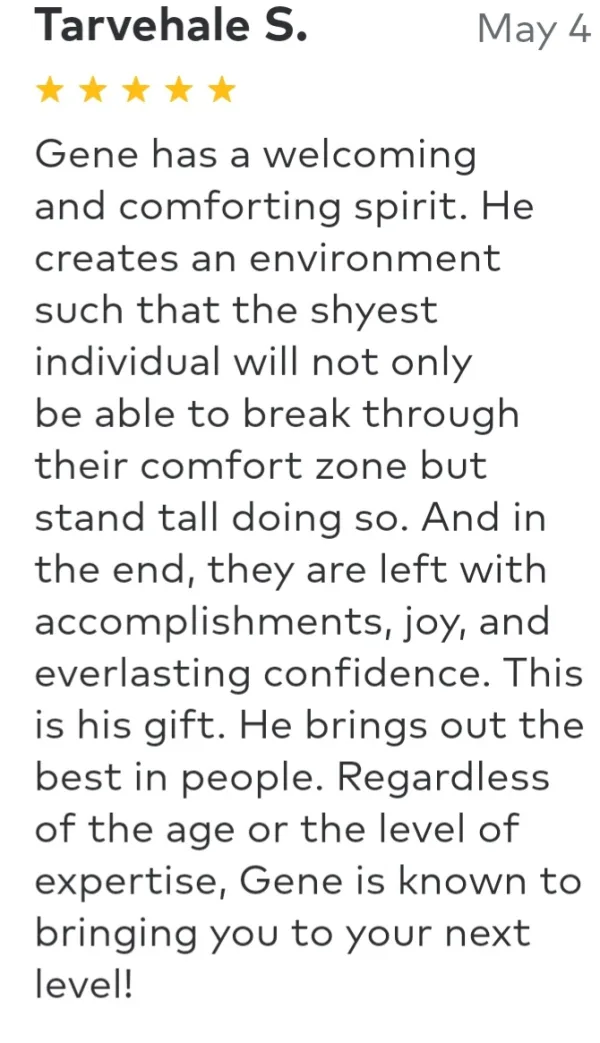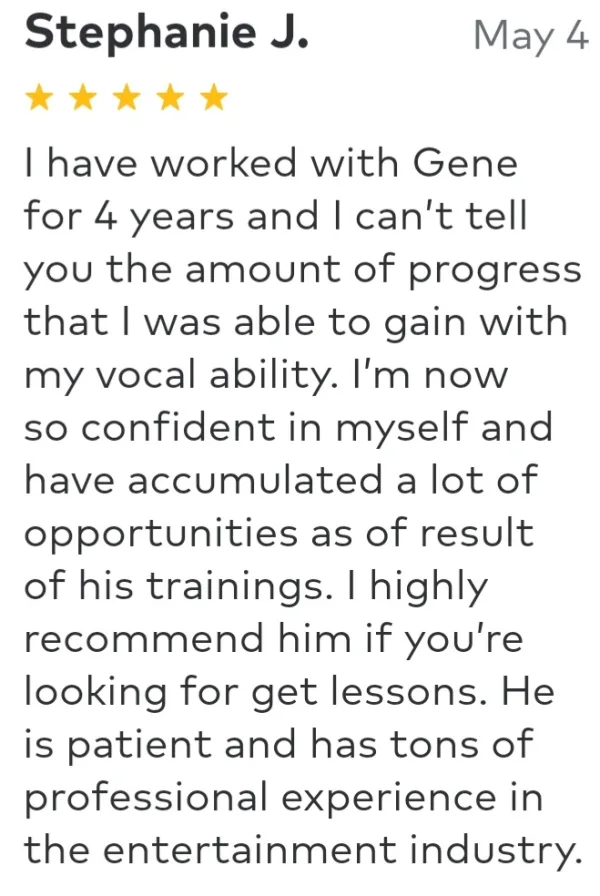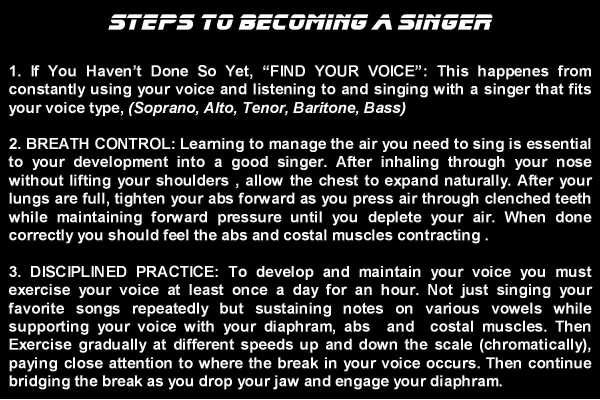Gene Townsel Music International
About
If you've been studying without the desired results, I guarantee that I'll get you the results!
I can help you with the following:
* Increased vocal strength
* High notes without strain
* Diaphragm control
* Intonation
* Vocal placement
* Microphone technique
Don't just learn vocal exercises. Learn to sing!
Specialties
Musical styles
Years experience
Able to read music
Lesson length
Student's age
Photos and videos






Reviews
craig K.
robin S.
Karen M.
Khalilah C.
Steven H.
Tai P.
Frequently asked questions
What is your typical process for working with a new student?
The first thing that I do is to assess the challenge that is facing the aspiring singer and put together a regimen and a plan to reach their goals.
What education and/or training do you have that relates to your work?
Before becoming a professional singer I earned a Bachelors Degree in Vocal Music from Florida A&M University and additional private study from Bob Selon in Hollywood,California.
Do you have a standard pricing system for your lessons? If so, please share the details here.
Below is my Quarterly (12 lessons) discount package rate of $45.00 per 1 hour lesson per week. The cost of this package is $540.00. This amounts to a 25% discount off my base rate of $60.00 per hour (payable @ $240 per month). All fees are based on advance payment, or if you can't pay the total package fee in advance, your discount will be 15%. This brings the cost of the package to $612.00 ($51.00 per lesson). This option is payable in two installments of $306.00. There is also a one time $25 registration fee. We accept most major credit cards and the $cash App., $EugeneTownsel. I'm also available for a 10 to 15 minute phone consultation to hear what your experience is, what you'd like to do and determine what I can do to help you. Call today for your free consultation.
How did you get started teaching?
After graduating from college and relocating to Los Angeles, I started teaching in private studios. After seeing an increase in requests for my services I eventually opened my own studio.
What types of students have you worked with?
I've worked with those with dreams to becoming professional to those who are working professionals. Among the pro-students that I've had the pleasure of working with is Academy Award Nominee Margaret "Sug" Avery, former IMX lead singer Marques Houston and Damon Hines of "Lethal Weapon"to name a few.
Describe a recent event you are fond of.
In 20016 I presented the Singers Dream Reunion Workshop and Showcase where former and current students were able to receive guidance from Berklee College of Music Professor Jeff Ramsey and perform in a cabaret setting.
What advice would you give a student looking to hire a teacher in your area of expertise?
A synopsis of what the singer should expect and do to be successful.
CONCEPTS AND PRECEPTS Why Do You Want To Sing? As you peruse this question, let us address why you should want to sing. In order be a successful singer you must have an incessant desire to sing. As the songbird is compelled to sing at the break of day, so must the singer have a similar compulsion. BASIC PRINCIPLES OF VOICE STUDY As we consider these principles, one must keep in mind that they are fundamental. They are at the core of your ability to control your voice. You should make them an integral part of your everyday discipline. 1.SINGING IS A PSYCHOMOTOR PROCESS: Let us first establish here that 85% of your singing is mental (Psycho) and the remaining 15% is physical (Motor).As you strive to control your thoughts and muscles in your quest to sing, remember that they are your thoughts and muscles. You are the only one that can coordinate them and make your voice function as you want it to. The teacher can show you the way, but you've got to dedicate yourself to persistent, hard and concentrated work. 2. YOUR SINGING MUST BE A PRIORITY: How strong your desire is to be a great singer is fundamental to your development. This is one area that no one can do for you. Not the teacher, not your friends, only you. Don't Let flattery or applause from others be the measure of your vocal development. You must stay focused if you are to overcome your vocal challenges. Don't be discouraged. Be motivated by the assured realization of what changes can happen in your voice if you stay focused. 3. A GOOD TEACHER IS A MUST: Although singing is established here as a psychomotor (mind/muscle) process and a do it yourself activity, having good instruction is essential. Since most people don't hear themselves as others do, it is important that you acquire a good professional teacher. The teacher can give you the necessary guidance that is paramount to the solutions of specific vocal problems. 4. BE INQUISITIVE ABOUT SINGING:In order to reach your potential as a singer you must listen and experiment with various styles of singing. Youll never know what your voice will do unless you put certain demands on it. Listen to other singers, from Classical to Gospel and Blues. Not only should you listen but you should watch great artists on television and in live concerts whenever possible. One caution however, dont confuse the commercial success of a singer with great artistry. In other words there are many commercially successful singers in the popular music industry that are not artistically good singers. Ask your teacher for suggestions on great artists. Then compare what you hear them do with what you are doing. See if you can do what they do . Ask your teacher about the techniques that youd have to learn to achieve what you hear. If you develop and maintain this kind of curiosity, your development will be greatly enhanced. 5. DONT BE IMPATIENT:Replacing a life time of singing habits with new singing techniques does not come quickly, or easily. The way that you sing is a result of personality and your concept of singing. It took years to make you what you are, so dont expect change to come in days, weeks or months. Be patient and be persistent in applying the principles and techniques in my book. In doing so your progress with be gradual and steady.
What questions should students think through before talking to teachers about their needs?
1. Why are you taking voice lessons? 2. What is it that you want to be able to do with your voice that you can't do at the present time. 3. Once you're able to perfect your vocal skills, what are your plans.